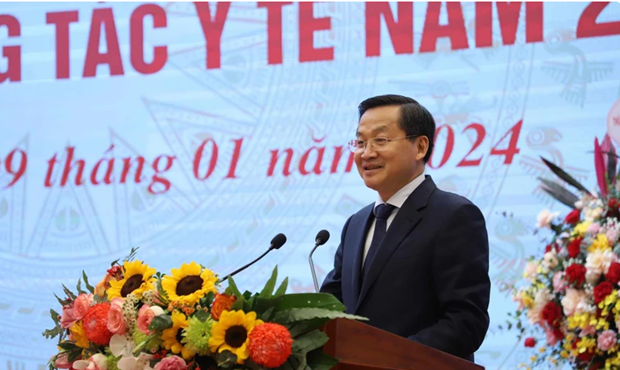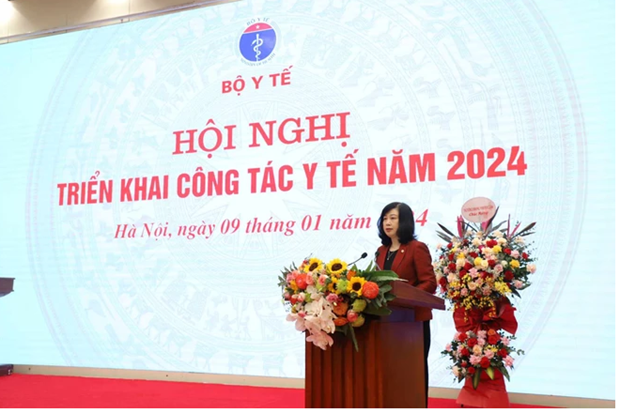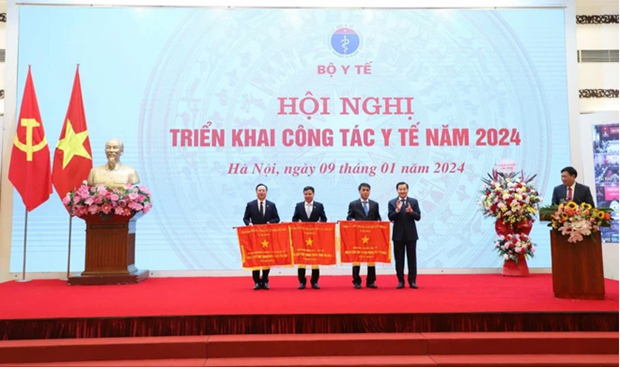 Deputy Prime Minister Le Minh Khai speaks at the conference. (Photo: VietnamPlus)
Deputy Prime Minister Le Minh Khai speaks at the conference. (Photo: VietnamPlus)Hanoi (VNA) – Vietnam is gaining recognition on the , Deputy Prime Minister Le Minh Khai has said.
Addressing a conference on launching tasks for 2024 held by the (MoH) on January 9, Khai said despite numerous difficulties, the medical sector has gained outstanding results. It consistently creates medical breakthroughs, applies high-end technologies, and is able to perform complex techniques such as organ transplants and endoscopy and robotic surgeries, he said.
Particularly, the World Health Organisation (WHO) has acknowledged Vietnam as a reference model in preventing and combating the COVID-19 pandemic.
According to the report presented by Minister of Health Dao Hong Lan at the conference, in 2023, the health sector successfully achieved all the three major socio-economic assignments set by the National Assembly. These included surpassing the target of having 12.5 doctors per 10,000 people, achieving the target of 32 hospital beds per 10,000 people, and raising the percentage of holders in the country to 93.2% of the population.
 Minister of Health Dao Hong Lan addresses the event. (Photo: VietnamPlus)
Minister of Health Dao Hong Lan addresses the event. (Photo: VietnamPlus)Localities have implemented many solutions to strengthen the capacity of the health sector after the COVID-19 pandemic such as increasing investment resources, attracting medical human resources, and strengthening supervision work in Hanoi, Ho Chi Minh City, Hai Phong, Da Nang and Quang Ninh, she said.
Regarding disease prevention work, the minister said that in 2023, the COVID-19 pandemic and other infectious were well controlled.
She stressed the significant progress in implementing the administrative procedure reform and digital transformation.
Lauding the achievements obtained by the health sector last year, Deputy PM Khai also pointed out limitations, including an inadequate legal system on health care and gaps in the quality of healthcare services between urban and rural areas as well as between public and private services.
Highlighting the importance of 2024, Khai stressed the need for the healthcare sector to strengthen the construction and improvement of institutions, mechanisms and policies.
There should be a focus on addressing shortages of medicines and medical supplies while efficiently controlling diseases.
The quality of healthcare services at all levels should be improved, he said, elaborating that it is necessary to promote the implementation of projects on satellite hospitals, family doctors, remote medical examination and treatment, and technical transfer along with improving capacity to provide essential healthcare services.
Investing in enhancing capacity of the healthcare system, especially grassroots and preventive healthcare, is essential, he said.
 Deputy Prime Minister Le Minh Khai presents the Government’s Emulation Flag to collectives with outstanding achievements in 2023. (Photo: VietnamPlus)
Deputy Prime Minister Le Minh Khai presents the Government’s Emulation Flag to collectives with outstanding achievements in 2023. (Photo: VietnamPlus)He also mentioned the need to expand health insurance coverage toward universal health insurance. Health insurance premiums should be adjusted in line with the roadmap of the adjustment of the service prices, the needs of the people, and the socio-economic development of the country.
Deputy PM Khai urged the ministry to comprehensively address existing issues, improve equipment procurement, and prepare human resources to put into operation branches of Bach Mai and Viet Duc hospitals in Ha Nam province.
The ministry was tasked with boosting resource mobilisation—especially through the public-private partnerships—in the health sector, supporting autonomy in public health facilities, and promoting the development of the private healthcare section./.
Source: VietnamPlus
